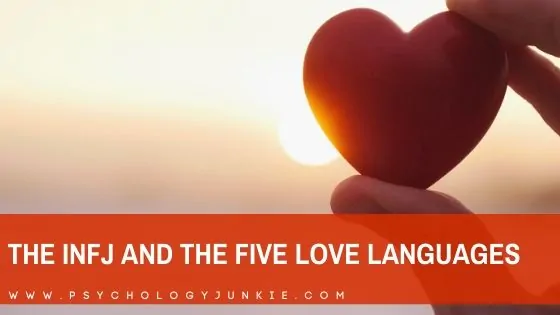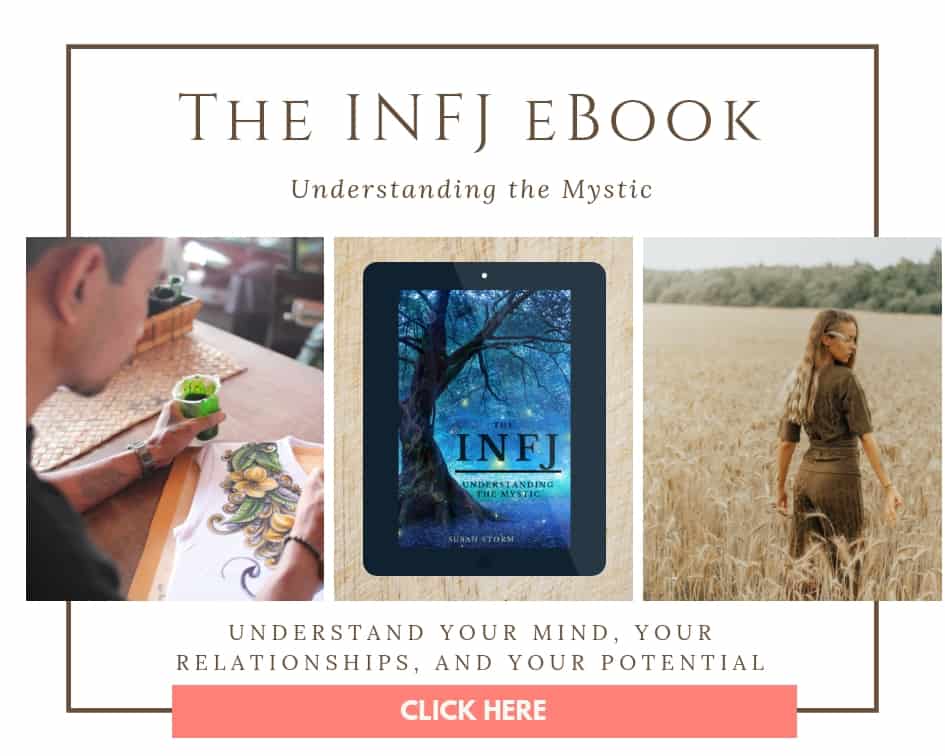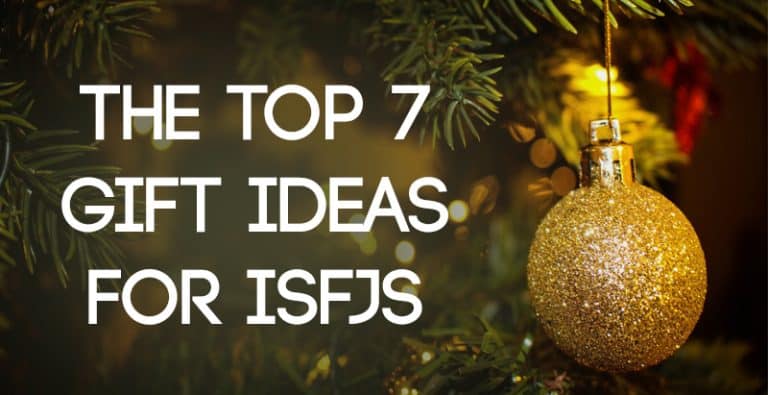The INFJ and the Five Love Languages
Have you ever wondered what your INFJ personality type can tell you about your relationships?
Using Myers-Briggs® types as a guide for romance or even friendships is something I usually counsel people not to do. Even though lots of writers will recommend specific type combinations they say work best in relationships (e.g. Intuitives should only date N-types), the reality is that two people of any personality type can make a relationship work if they’re willing to put in the effort. A mutual willingness to understand each other and work on becoming a healthy version of your own type is a much better predictor of relationship success than what your personality types are.

The best way to use Myers-Briggs® theory for relationships is to help you understand yourself and the person you’re with (and for them to understand you). In that sense, it’s similar to another tool called The Five Love Languages. The theory of love languages was first published by Gary Chapman, a relationship counselor and pastor. He says every person has one or more favorite “languages” that they use to communicate and receive love.
Much like learning about personality types can help you understand yourself and others better, learning about yours and other’s love languages helps you understand each other and improve communication. Love language preferences are often talked about in romantic relationships, but they also affect other relationships like friendships and parent-child relationships. Speaking the love languages of people you care about in ways appropriate to your type of relationship is a great way of strengthening your connection and build trust.
This article contains affiliate links. If you purchase an eBook from one of my links I get a small percentage back to help run my site.
Not sure what your personality type is? Take our new personality questionnaire here. Or you can take the official MBTI® here.
The Connection Between Type and Love Language
Not surprisingly, a person’s Myers-Briggs® type has an influence on which love language they’re most likely to use. Your INFJ personality type describes how your mind works, and your love language is partly a result of that. We all have different backgrounds and preferences, though, which make us unique individuals even when we share a personality type.
It’s possible for two INFJs to have completely different love language preferences. However, there are some trends regarding which languages are more common for INFJs. We can also look at how being an INFJ influences the way you use each of the five different love languages.
Our personality type’s preferred function for interacting with the outer world also influences how we love. That’s something Personality Hacker points out in their article “How Does Each Personality Type Ask, ‘Do You Love Me?’” I highly recommend reading it if this topic interests you.
INFJs, who use Extroverted Feeling as our auxiliary process, naturally say “I love you” by meeting other’s needs, checking in to make sure they’re okay, showing them appreciation, and doing our best to keep them happy. When we ask, “Do you love me?” we’re wondering whether or not we’re safe with the other person, if they’ll check in with us and acknowledge our needs, if they feel connected to us, and if they accept and approve of us.
INFJs’ Two Favorite Love Languages
There are five different love languages: Words of Affirmation, Quality Time, Receiving Gifts, Acts of Service, or Physical Touch. From what I’ve seen online and the INFJs I’ve talked with, Quality Time and Words of Affirmation are the two most popular love languages for INFJs. This holds true for me, since Words of Affirmation is my favorite love language, though it’s closely followed by Physical Touch.
INFJs preferring Quality Time and/or Words of Affirmation is also supported by a survey conducted by Heidi Priebe. According to Priebe’s survey, 35.67% of INFJs list “Quality Time” as their preferred love language. This is followed by Words of Affirmation (25.54%), Physical Touch (21.83%), Acts of Service (14.04%), and Gifts (2.92%).
This makes sense based on INFJ descriptions and what Personality Hacker says about how we prefer to give and receive love. Quality Time fills an INFJ’s need for deep, meaningful interactions with other people, particularly the ones we care about most. It’s a way for our loved ones to tell us without words that we’re special to them and they’re not going to abandon us. In terms of how INFJs speak Quality Time, we love having closer relationships with people but have a limited amount of social energy. If we’re choosing to spend our quality time with someone, that’s a way for us to show them they’re really special to us.
Words of Affirmation also makes sense for INFJs. Many INFJs love words, language, writing, and communication. We often thrive on finding meaningful ways to express ourselves and we appreciate it when others express themselves through meaningful words. Hearing words of affirmation also appeals to our harmony-seeking Extroverted Feeling side since it’s a way for others to acknowledge they see how much we’re trying to meet their needs.
INFJs and The Other Love Languages
Of course, every INFJ is a unique individual and not everyone has the same preferences for showing and receiving love. Quality Time and Words of Affirmation are the preferred love languages for over 60% of INFJs, but that still leaves about 40% using the other three love languages.
Physical Touch is something many INFJs are cautious about. You’ll rarely find INFJs engaging in casual touch with just anyone. Touch (even something as simple as a hug or a pat on the shoulder) is usually something we only enjoy from people we trust and are very close to. But for many INFJs, touch from those we love is extremely meaningful and for some, it’s their preferred love language.
Acts of Service isn’t a surprising love language for INFJs either. As FJ types, one of the main ways that INFJs interact with the outer world is by trying to identify and meet the needs of everyone around them. For many of us, that can manifest as doing things for other people. Many of us also feel loved and appreciated when those we care about return the favor by recognizing and meeting our needs through Acts of Service.
Gifts are where INFJs score lowest, but there are still INFJs who see this as the most meaningful way to express and receive love. For INFJs who care about gifts, they often enjoy giving just as much (or more) than receiving gifts. When someone does give you a meaningful gift, it speaks to the fact that they care about you enough to pay attention to what you need and want. The physical value of the gift means very little. What matters is that the gift is a physical representation of the fact that your loved one is thinking about you.
Your Turn
If you’re an INFJ, I’d love to hear which of the love languages you identify with most. If you’ve never taken a love languages test, you can click here for the official quiz. It’s free on Gary Chapman’s website.
Find out more about your personality type in our eBooks, Discovering You: Unlocking the Power of Personality Type, The INFJ – Understanding the Mystic, and The INFP – Understanding the Dreamer.
Other Articles You Might Enjoy:
The Flirting Style of the INFJ Personality Type
7 Things That INFJs Experience as Children
About the Author:
Marissa Baker is the author of The INFJ Handbook (available in the Amazon Kindle Store). You can find her online at LikeAnAnchor.com where she blogs about personal growth and development from a Christian perspective.











I am an INFJ and my love languages are Quality Time and Gifts. I definitely agree with your sentiment as to why an INFJ might appreciate gifts (receiving or giving). It shows that you thought of me while away and pay attention to my likes/needs/tastes. That being said – a gift doesn’t have to be anything physical either. I find myself just as touched when someone sends me a link to a video they thought I’d like or a funny meme. Likewise, quality time doesn’t necessarily mean going out or sitting and talking.. A quiet day in with us doing our own thing while together is just as good (if not better). It feels good to know that they are there should we want/need them and that they are comfortable being themselves while with me.
Not surprising for most INFJ’s
I’m INFJ but for me quality time and touch are at the top. As child I lacked personal connection and I longed for it, thus quality time.
Also, I think of touch as a quality moment of intimate proximity, so I love a hug. Now these days, maintaining personal space is considered a virtue. However, if someone is willing to risk invading my personal space by asking for a hug or say giving a gentle tap on my shoulder as they punctuate a statement, I see that person as being willing to step out of themselves to make a meaningful connection. That is very powerful to me.
On the other hand, words of affirmation are very low on the list for me. As a child, I was given lip service and broken promises. So, in that regard, I concluded that talk is cheap and meaningless when communicating affection.
Bottom line: when a person goes out of their way to make what I view as an intentional, direct, meaningful connection (touch and quality time), that’s what I perceive most as an expression of love.
Here’s another INFJ whose primary love language is Quality Time! My secondary love language is Acts of Service. I expect and cherish shared meaningful time with my loved one(s) and I also appreciate practical day-to-day help too. Naturally, I also strive to be as attentive and reliable as my Love Languages would tell. Relationships are a two-way street, after all.
Regarding the other love languages, I’m not so sure what to think about them. In general, I like Words of Affirmation but I’ve also had some bad experiences in regarding to that. Sugary words can never replace or compensate abusive or indifferent behavior. The same goes with Physical Touch: I’ve been molested in my pre-teens and am still quite selective about who gets to touch me and when. I don’t mind a strong and sincere bear hug though, in fact I love them. Gifts has been the most difficult love language for me to learn but as my family is full of obvious “gift speakers”, I’ve learned to do speak it as well lol. And mind you…they in fact buy you some EXCELLENT gifts!
Yours truly,
A Random INFJ
I’m one of the odd INFJs who scored highest in Gifts. This was closely followed by Words of Affirmation and Quality Time.
Like Athena said, Gifts can ruin the gamut and it’s true, the gift has less to do with the material value than the thought behind it. It’s a tangible reminder that someone was thinking of me and pays enough attention to my personality to know what I like. That’s not to say that I’ll turn down something of quality. We do appreciate aesthetics after all.
The other part of the equation is that I really enjoy GIVING gifts (especially for no reason.) I’m a crafter/artist/writer, so if I can create something for a loved one and they enjoy it, I’m over the moon.
I’m also a collector and if I notice someone appreciating an item that I’m not so enamored with anymore, I will gladly gift it to a new home where it will be better loved. I’m happy to see the other person happy (and it’s also helpful to declutter when you’re a collector, so it’s a win-win.)
Hopefully, this adds some angles to the Gifts love language. It feels like an easily misunderstood love language but there use actual depth in it.
I love this 🙂 I always thought mine was quality time as a child (lol I’m a middle child so I guess I just craved it haha) but have since learned as I’ve grown up and moved around more that it’s definitely words of affirmation. I could be away from someone I love for weeks at a time, but the right words and conversation will keep them on the forefront of my mind constantly. In fact I have a list in my phone of words people have said to me that have changed me or meant a ton. I’m also a huge believer in the “never suppress a generous thought” philosophy, as I find pretty much no one is given enough positive affirmation in their lives. Such a good article! <3